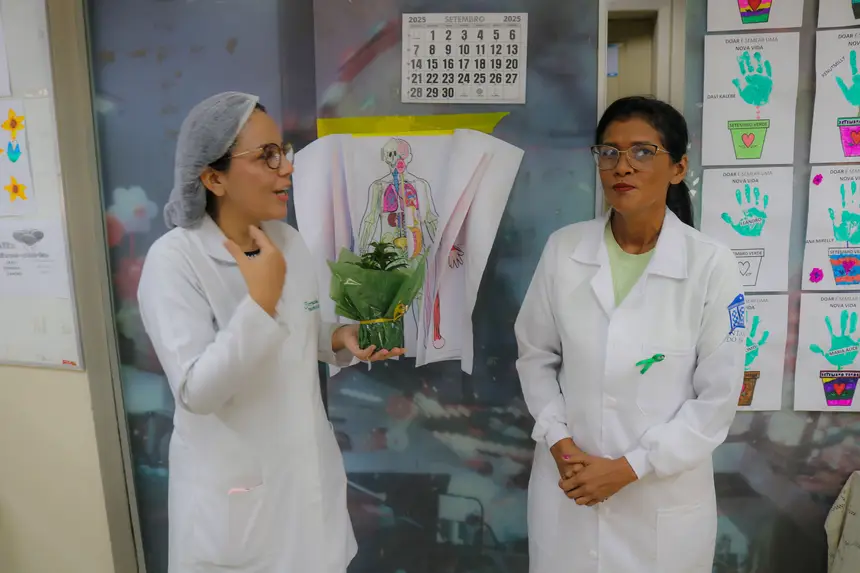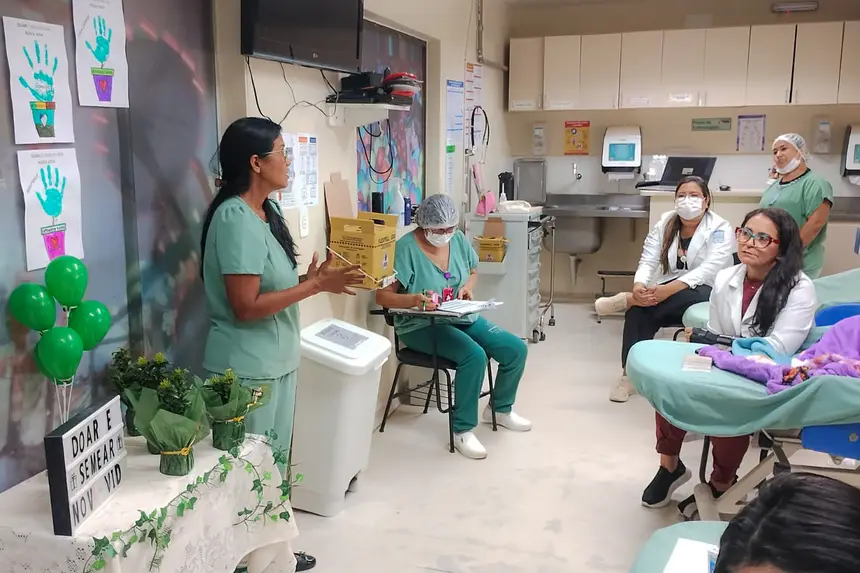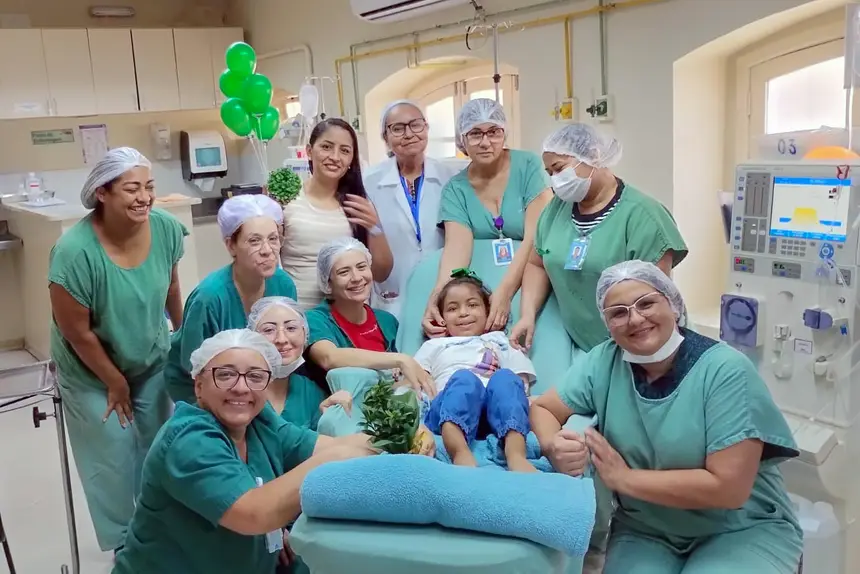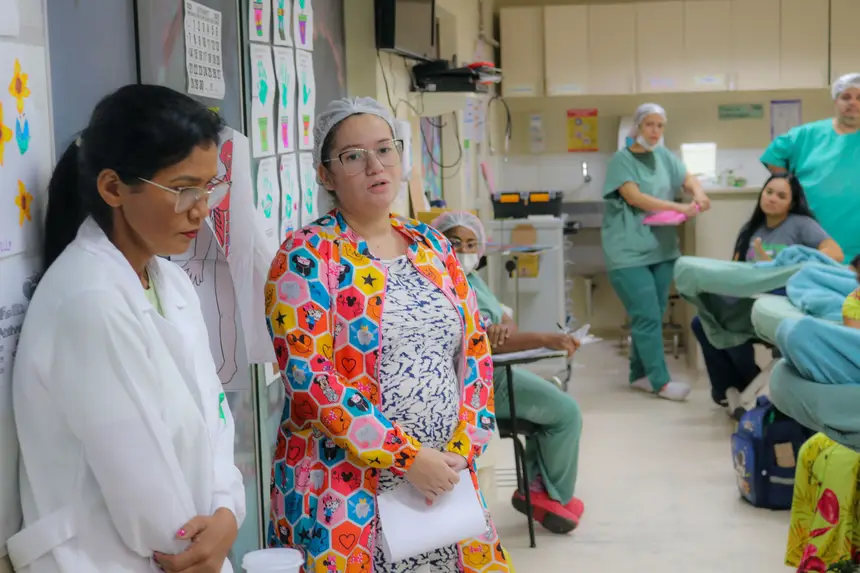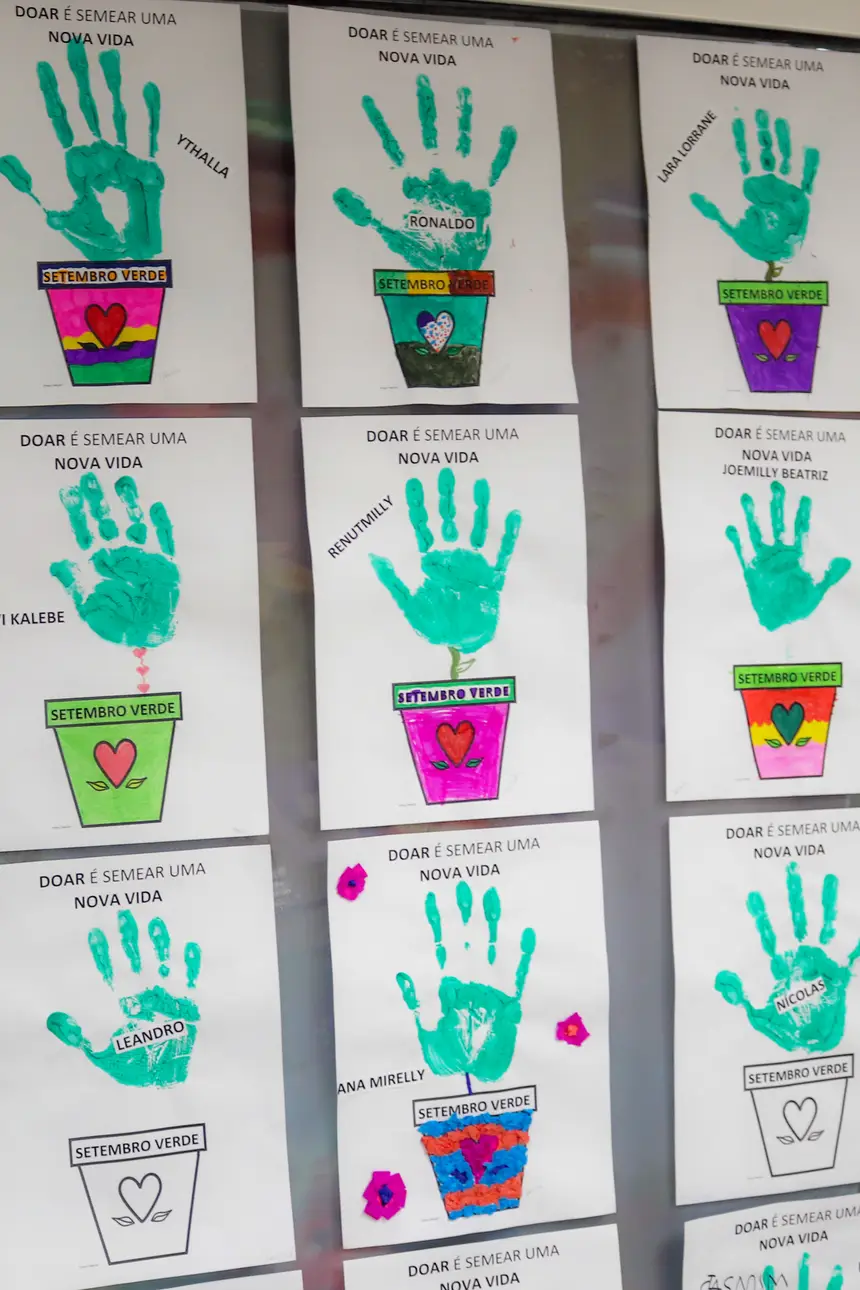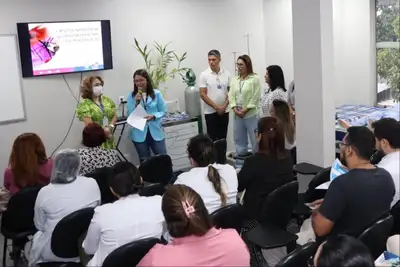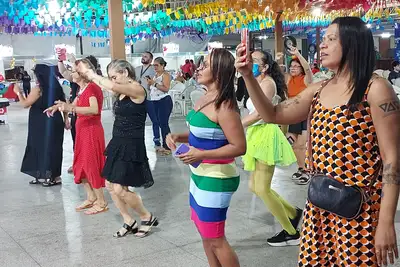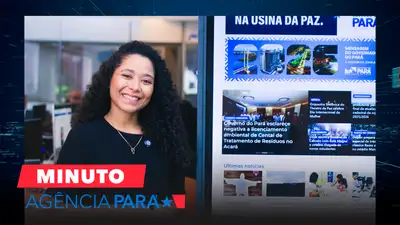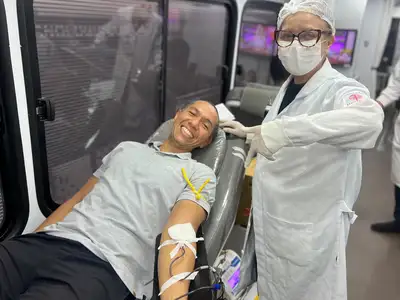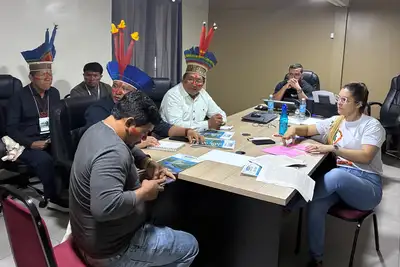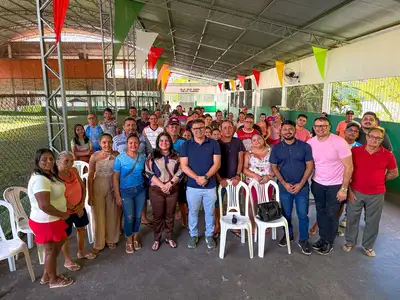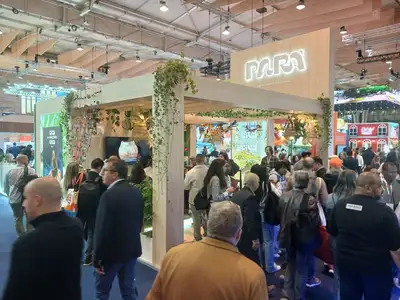Conversation circle in the renal area of Santa Casa reinforces the importance of organ donation
The initiative reinforces the importance of kidney care, treatment, and post-surgical care
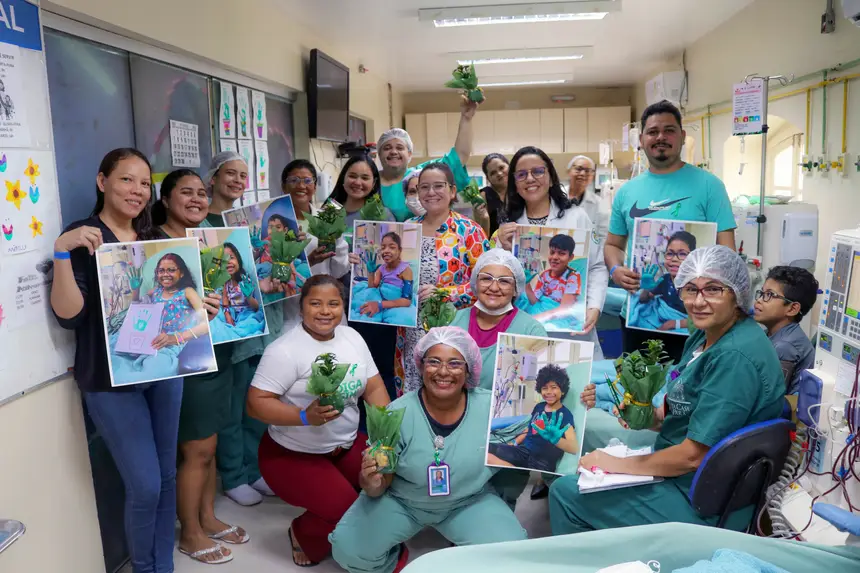
With the theme "To donate is to sow a new life", the Green September campaign in Pará emphasizes the importance of organ and tissue donation and reinforces the work of professionals working in the Pediatric Renal Therapy Service of the Santa Casa do Pará Foundation. This week's program included the participation of staff, patients, and users.
Fernanda Lobato, an occupational therapist in the pediatric renal area, highlights that the conversation circle is an educational moment, "where we gather the entire multiprofessional team, along with the patients and their companions, integrating this care and passing on information, dissolving any doubts, demystifying fears regarding a theme that is very present in their lives, which is the expectation of transplantation."
“Although it is a complex theme and sometimes a process that requires a lot of care, through the conversation circle we try to simplify it in a more accessible language, sometimes with even more playful guidance, so that the child minimally accepts it, and the family also knows each of the processes, the care involved both in preparation, during the transplant period, and post-transplant as well,” the therapist adds.
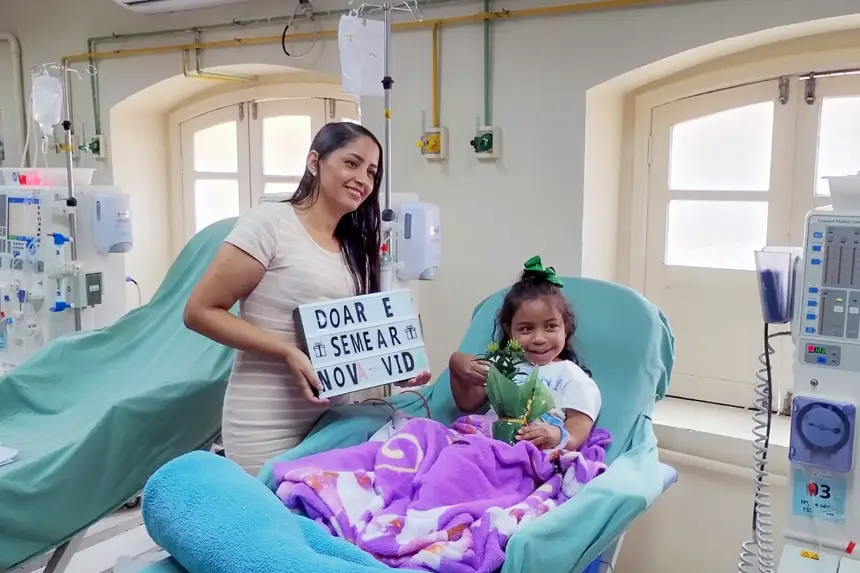
Renutimilly Braga de Oliveira, 9 years old, has been on dialysis at Santa Casa since she was one year old, and says she will receive a kidney that is a gift from her mother. “I am very happy with this gift. I will celebrate with my family.” Her mother, Rosiane Ferreira Braga, who is from Altamira, reports that she has been with her daughter in Belém for 8 years, and after all the preparation decided to donate her kidney to her. Rosiane emotionally highlights the importance of the act. “It makes a big difference in our children's lives. She is the youngest of my three children. But she is the only one who was born with this kidney problem. And over time, I put in my heart, since her first pre-transplant consultation, the desire to be the donor for my daughter.”
“In her first consultation, I asked the doctor if I could be the donor. And she said yes, so since then I have been going through this process. There are many things we have to do, many tests to see if it works. Especially because her blood type is more difficult. She is B positive, so it is a bit rarer for her to receive a compatible organ from another donor. And mine is B positive. And it had to be because I have always had this desire to be her donor,” Rosiane shares emotionally. The transplant is scheduled for next week.
The Act of Raising Awareness - Adriana Bejamim, a nurse in the transplant area, participated in the conversation circle clarifying and answering people's questions. For her, the objective of this action is to raise awareness among families about the importance of transplantation and the need to raise more organ donors. “To talk to their families about kidney transplantation, at the moment when their children are on a hemodialysis machine waiting for a transplant, and especially to explain to them the entire transplantation process, from the moment they are referred to the pre-transplant outpatient clinic, the intra-operative phase, and the post-operative phase of that child.”
“And we normally provide these clarifications every semester. Usually, in this conversation circle, we clarify to parents, families, and professionals. The transplant is of utmost importance for this child, so that she can have a social life, a life at school, that she can return to activities, and have a life with more quality,” the nurse clarifies.
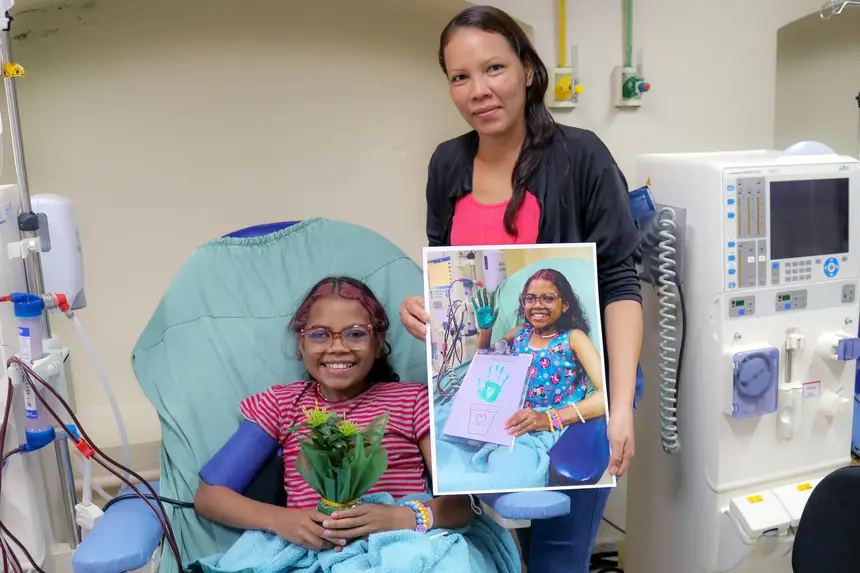
Joycianne Sousa Trindade, a housewife living in Santa Izabel, in Greater Belém, is the mother of Joemilly Beatriz Trindade, six years old, who undergoes hemodialysis three times a week at Santa Casa. She shares that her daughter is on the waiting list for a kidney. “I believe that by the end of this year she will get her kidney. We are in the chain for a donation. This act of donating is very important. The family that donates knows that this donation is the continuation of another life, for other families. And it is always good to think this way.”
“Events like this are very important because many parents do not know the importance for our children, which prolongs their lives more and more. These lectures about transplantation reinforce for us a hope to always keep faith for better days for our children who are treated in the hemodialysis area,” Joycianne points out.
The nephrologist Ana Carolina Abraão emphasizes that these events mainly serve to raise awareness and clarify doubts. “Even though we have almost daily contact with mothers and caregivers of the children who come for consultations or come for hemodialysis, there are always some doubts. Sometimes a doubt that seems simple to some changes destinies for others,” she reports.
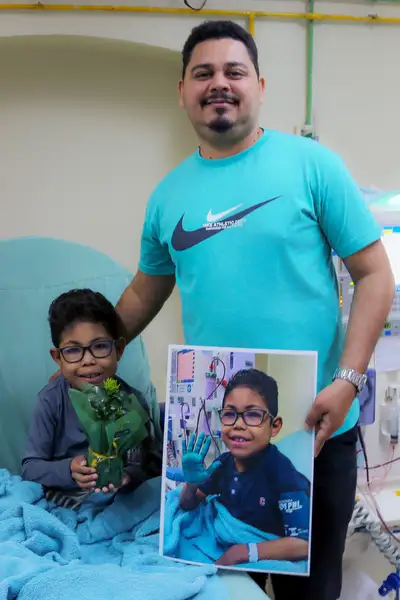
“By periodically holding these conversation circles, we can clarify points and questions that are important to the caregivers, and at the same time, we can raise awareness about actions such as organ donation. And the more transplants that happen, the more lives are renewed, and more spots are opened for treatment at Santa Casa do Pará, which offers this type of treatment in the pediatric renal area,” she concludes.
The doctor reinforces that the more transplants occur, the more children tend to return to a more inclusive life in society, and consequently, more spots for treatment are opened. “So our goal is always that the more transplants happen, the better the future for our children,” says the doctor.
Currently, 23 children are undergoing hemodialysis at the Pediatric Renal Therapy Service of the Santa Casa do Pará Foundation, which has been operating in the institution since October 2011. During this period, Santa Casa has already performed 41 kidney transplants.
Anyone can be a potential organ and tissue donor. There is no need for registration in a notary or official documents. Just inform the family of the desire to donate, as the authorization depends exclusively on the relatives.
Program - As part of the programming related to Green September, the State Health Department of Pará (Sespa) in partnership with the Santa Casa de Misericórdia do Pará Foundation (FSCMPA) will hold the live event “To Donate is to Sow a New Life,” which will clarify the importance of organ and tissue donation and reinforce the truths about the act of solidarity, as well as clarify doubts that hinder the decision to donate.
Participating in the live event are Dr. Alfredo Abud, coordinator of the State Transplant Center (CET) of Sespa; digestive surgeon Rafael Garcia, technical responsible for the Liver Transplant at Santa Casa; pediatric nephrologist Monick Calandrini, coordinator of the Pediatric Nephrology Service (CNEP) and the Pediatric Renal Transplant Program at Santa Casa; and social worker Ana Gabriela Mesquita, a transplanted patient. The live event will be moderated by psychologist Klaudia Sadala and can be accessed on Sespa's channel at this link.
On the 25th, an Interdisciplinary Forum on the Maintenance of Potential Donors and the launch of the Potential Donor Maintenance Manual will be held at Santa Casa; and on the 28th, Sespa, Sesma, Santa Casa, and Hemopa will hold the closing of the Green September Campaign with cultural and leisure activities at Praça Batista Campos.



